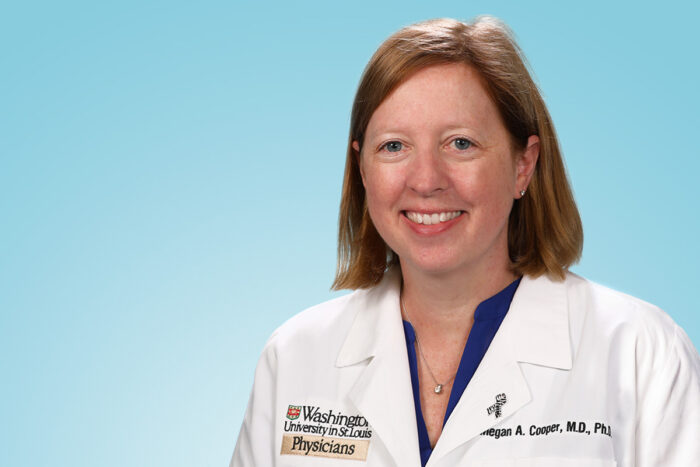Cooper named director of pediatric rheumatology & immunology division
Recognized for clinical care, research in immunodeficiency, immune dysregulation
 Washington University
Washington UniversityMegan A. Cooper, MD, PhD, has been named director of the Division of Rheumatology & Immunology in the Department of Pediatrics at Washington University School of Medicine in St. Louis.
Megan A. Cooper, MD, PhD, an internationally recognized physician-scientist in pediatric immunodeficiencies and immune dysregulation, has been named director of the Division of Rheumatology & Immunology in the Department of Pediatrics at Washington University School of Medicine in St. Louis.
A member of the School of Medicine faculty since 2010, Cooper specializes in diagnosing and treating children with rare genetic diseases affecting their immune systems. She also serves as director of the Clinical Immunology Program in pediatrics, overseeing a collaboration across the divisions of rheumatology & immunology; allergy & pulmonary medicine; hematology & oncology; and infectious diseases. Patients throughout the Midwest are referred to the program, based at St. Louis Children’s Hospital, for evaluation and treatment of immunodeficiencies. Cooper also is the director of the Jeffrey Modell Diagnostic and Research Center for Primary Immunodeficiencies at St. Louis Children’s Hospital.
In the lab, she studies the underlying genetic causes of rare pediatric immune deficiencies. Her research has led to the discovery of two new immune conditions in children and the genetic errors at the root of those conditions. These discoveries have allowed for early diagnosis and treatment of children with such diseases, as well as the development of new therapies that are now in clinical trials. Her research also was recognized by Washington University in 2019 with the prestigious Emil Unanue Prize for Innovative Research in Immunology.
“Dr. Cooper is renowned for her scientific contributions and exceptional clinical care,” said Gary A. Silverman, MD, PhD, the Harriet B. Spoehrer Professor and head of the Department of Pediatrics. “She is illuminating the path forward for pediatric rheumatology and immunology, and brings expertise, boundless compassion and visionary thinking to this leadership role.”
A leader in human immunology, Cooper also is the scientific director of the Center for Pediatric Immunology, which recently received $5.3 million in funding from the Children’s Discovery Institute – a collaboration between Washington University School of Medicine and St. Louis Children’s Hospital. The center’s primary goal is to provide scientific infrastructure to help investigate and create novel therapies for pediatric genetic diseases impacting immunity.
Cooper has a special interest in studying a subset of immune cells – called natural killer (NK) cells – that can kill other cells and plays an important role in viral infections and cancer. She identified and characterized a class of NK cells, referred to as cytokine-induced memory-like NK cells, which has led to them being tested in clinical trials for pediatric and adult malignancies.
Strongly invested in mentorship and the development of academic physicians and scientists, Cooper previously served as director for the Pediatric Rheumatology Fellowship Program and currently serves as an associate director of the Medical Scientist Training Program at the School of Medicine, which trains students pursuing dual MD/PhD degrees.
Cooper earned her undergraduate degree from The College of Wooster and her doctorate and medical degrees from The Ohio State University. She completed her residency in pediatrics at St. Louis Children’s Hospital and her fellowship in pediatric rheumatology at the School of Medicine.
Cooper’s new role previously was held by Anthony R. French, MD, PhD, the Alan L. Schwartz Chair of Pediatrics. He is stepping down from the position to become the new vice chair of physician-scientist training in pediatrics.
French, a physician-scientist highly regarded for his expertise in pediatric rheumatology and NK cell immunobiology, has developed into a key leader in training the next generation of physicians and scientists. Together with David Hunstad, MD, a professor of pediatrics and division director of pediatric infectious diseases, French co-directs the Pediatric Physician-Scientist Training Program, mentoring talented young physician-scientists from residency through fellowship and during their transition to independent laboratories and clinical practices.
Read more on the Pediatrics website.






